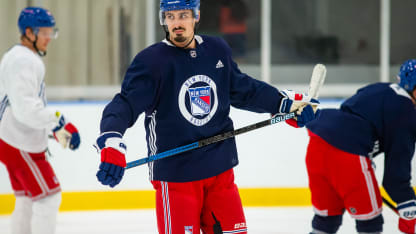Brett Howden has shown the Rangers a lot of things over the course of two full Training Camps and one full NHL season; complacency isn't one of them. Howden was somewhere around the midpoint of a successful rookie campaign, which was not without the customary first-year bumps and (quite literally) bruises, when he began thinking seriously about what more he could be doing away from the ice to hone his performance on it.
"Last year halfway through the season, one of the things I wanted to do was I really wanted to just clean up my eating and everything like that," said the Rangers' 21-year-old center. "I talked to Chris about it, and he was helping me a lot with what I wanted to do."
Leadership Is Right In Chris Kreider's Kitchen
Setting A Standard for Young Rangers: 'Do The Stuff He Does'

© Jared Silber
By
Michael Obernauer
Six months or so later, when Howden wanted to alter his summer plans and come back East early for training, there was the issue of where he would stay. "So I came back and lived with Chris for July and August," Howden said.
"As a young player, he is there for us, as are all the other older guys. Chris just tries to help you out in every single way."
Chris would be Chris Kreider, the Rangers left winger who was drafted by the Blueshirts in the first round a decade ago and today stands as the longest-tenured forward on the team, and among the top 50 in franchise history in games played, goals and points. Once last season ended, Howden went home to Manitoba to begin offseason training and to spend time with family and friends; his plan all along was to do like the summer before and rejoin his teammates in August at Ben Prentiss' gym in Stamford, Conn. When the opportunity arose to come back more than a month early and get in on Kreider's own workouts with Prentiss, Howden packed his bags.
Why? "You know, I know, everybody knows," Howden said. "Everyone knows how (Kreider) is about his body and how he gets ready for the season, how he prepares. And everyone knows how explosive and strong he is, and everything like that. I thought it would be a great learning experience for me and a good time for me to come back. Do the stuff he does."
Kreider's off-ice and offseason workouts and work ethic have for years been renowned not just around the Rangers but around the sport - there is ample evidence of this on the ice, and also on YouTube, where you may have seen the video of Kreider, standing still, leaping out of a waist-deep swimming pool.
But as Kreider's veteran stature has grown - he is setting out on his eighth regular season as a Ranger, his second with a letter on the front of his Blueshirt - what is coming into sharper focus is the kind of ripple effect a workhorse like Kreider can have in developing a young team's dressing room, and the ways in which Kreider's leadership often manifests itself well away from the rink, far out of the spotlight. Like the way in which he took Brett Howden under his wing this past summer.
"I don't approach it like that," Kreider said in an interview with NYRangers.com. "All I know is that Ben is the best in the world at what he does, and he's right in our backyard. For guys that don't take advantage of that resource, it's a sin. So I give guys a hard time about doing it."
Kreider has known Prentiss since his days playing at Boston College, but has been an avid disciple since joining the Rangers in 2012. Today there is a laundry list of Blueshirts who come to work out at Prentiss' gym in the summertime, and Prentiss has held the title of Strength and Conditioning Consultant in the Rangers organization since 2017.
"The team did a good job of strongly encouraging the prospects to go to Ben, and I think (the prospects) saw the gains that they were able to make," Kreider said. "You really don't have to twist many arms to get guys come back."
Howden, Lias Andersson, Mika Zibanejad, Boo Nieves, Filip Chytil, Brendan Lemieux: These are just a few of the Rangers who made their way back again this summer to train under Prentiss' guidance - and who have drawn raves from Rangers management for the shape they were in when they reported to Training Camp. That, of course, reflects as much as anything on Prentiss, but as much as Kreider wants to deflect 100 percent of the praise onto his trainer, the prospect of doing what Kreider does can be magnetic for the organization's younger players.
"It's a huge reason why I wanted to come down here," Howden said. "He's a veteran guy and he's been playing for many years now, and he's been through it all, through all the playoffs, conference finals, finals and everything. I knew that he would be a good mentor for me, on and off the ice. In training, he helped me out every day. Chris is pushing himself so hard, he's pushing me, we're pushing each other to be better every day."
"I didn't do much; he's very self-motivated," Kreider said of Howden. "Ben is an unbelievable resource, and Howds took full advantage of that. And he's in the best shape of his life as a result."
Howden is part of an NHL roster that is the only one in the League with five players age 21 or younger, and eight players no older than 23, and those figures don't cover the young players in Hartford and elsewhere, some of whom could be primed to join the NHL roster at any time. Which is why the Head Coach of the Rangers innately understands the kind of impact it can have on an organization for the professional habits of someone like Kreider to rub off.
"Just over the summer, the impact he had on our organization was huge, working with all those guys at Ben Prentiss'," David Quinn said. "I think half the team was staying at his house - he was running a bed-and-breakfast over there in Rowayton.
"It's not only what you see that he does for us on the ice," Quinn added of his winger who matched a career high with 28 goals a season ago. "What he does away from the rink with these young guys is invaluable."
If the Chris Kreider B&B had a rewards program, surely Howden would have platinum status. "Howds was talking about coming kind of later in August, and I said, 'You should get here a little earlier than that.' And he agreed," Kreider said. The biggest obstacle was that Howden would need a place to stay. "So I said I had a bed for him. So he came and he was around and it was great. He's obviously a good kid, and he's a good friend, a good teammate. The kid has his head on straight."
The time living with Kreider amounted almost to immersion study for Howden, with the opportunity to observe Kreider's round-the-clock approach, as well as to pick his veteran teammate's brain during quieter moments away from the gym.
Many of the more valuable and lasting lessons, Howden said, occurred in the kitchen.
"He helped me lots with cooking - lots," said Howden, who prior to his rookie year played four seasons of Major Junior, where players live with billet families and can't exactly dictate the grocery list in their host family's home. "I knew a little bit about cooking, but definitely not to the extent I know now. Now I really understand all the foods that you're supposed to be putting in your body, and what time is good for what foods and such. And how to start making recipes and just being able to make food the right way for me. He helped me out a ton."
Kreider attributes his lifelong work ethic to his parents, Kathy and David, who worked long hours and endured lengthy commutes between Boxford, Mass., and Boston to allow Chris and his younger sister, Katie, a four-year letterwinner in soccer at Hamilton College, to pursue their athletic goals.
There was barely a time in Chris' life when he wasn't deadly serious not just about playing hockey, but working at it: "When I was 10 years old, when I decided I wanted to do this for a living," he said. "I'm still not a good hockey player; I'm an athlete first. I'm trying to pick up the game. I did a lot of stuff growing up, not just playing hockey, but hockey was always business for me."
After Phillips Andover Academy, he went on to Boston College, which remains a sore spot for his current coach. "Oh, we recruited him," said Quinn, an assistant coach at rival Boston University through Kreider's high school years. "That didn't go well."
"When you're that age, you don't really know the depths of the type of leader a guy might be," Quinn said. "But I did know how well he took care of himself, and the way he lived his life away from the rink, even back then, was beneficial to a team."
Kreider said it was a close call between BC and BU, but he wound up winning national titles with the Eagles in 2010 and 2012, while honing the off-ice work ethic that has flourished in his pro career. "My freshman year we had a group of seniors that were built like Greek gods," he said. "Ben Smith, Matt Lombardi, Matt Price - they were specimens. That gym is full of gorillas. You can't find a guy who's not pouring it out every day in the gym. You're surrounded by it."
When he arrived on Broadway and took the place by storm in the 2012 Stanley Cup Playoffs - his five goals in 18 games that spring are the most any NHL player has ever scored before ever playing in a regular-season game - he was surrounded by players like Brad Richards, Ryan McDonagh, Marty Biron, and a couple years later Martin St. Louis (another Prentiss devotee), players of whom Kreider said, "I tried to steal a little bit of something from every single one of those guys.
"Progressive learning," he said. "You'd see some of the things that they were doing and you just keep on trying to improve every day like they did."
Today, Kreider is surrounded by players whose ages are just right for Boston College but whose abilities have brought them to the Rangers, where Chris Kreider's year-round impact can be seen, felt, even heard.
"Coming out of this summer I just feel way more confident in my body this year. There's another level of confidence there," Howden said. "I feel like each day I'm taking a step forward. That's the idea, you just want to keep getting better every day."


















